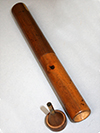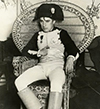| |
| |
At the Crossroads
It made no sound. There was no flash, bang, or indeed any heroics. And yet, this no-holds-barred conflict fought on a world stage was decisive for the Napoleonic adventure. The weapon was ink not gunpowder, as bankers and financial dealers of all sorts faced off in a fight to the death. Here it was all about financial and economic warfare. For this other fight, Napoleon once again became a peerless strategist, creating his own money, his own bank, and everywhere deploying his ‘fiscal army' in attempts to make his policies successful. He enacted a strict continental blockade of Britain and changed customs regulations across Europe. All with one compound aim: the economic suffocation of Britain and the triumph of French imperial commerce. Mathematical genius though he was, Napoleon (like many others) forgot, however, that economics is more an art than a science. From time immemorial, the hopes and fears (even terrors) of those who make the economy, in other words, you and me, have more influence on the world's destiny than any economic rules whatsoever, even those dreamed up by Nobel prize winners. And the period in question had plenty of those hopes and fears. Slumps and bankruptcies disturbed attempts at the time to introduce fragile equilibria. “Bold” financiers tried to find the philospher's stone to turned lead into bullion, but just like their predecessors, these latter-day Cagliostros ended up with similar disasters. There were however in the monetary sphere some extraordinary successes, so surprising indeed that nobody at the time was able to measure the implications. In both economics and finance, then, France was at a crossroads. In March, the Fondation Napoléon is organising with the Banque de France and the Souvenir Napoléonien a conference dedicated to Napoleon I and economics. We will be bringing together historians, economists, and economic deciders so as to dive back into these deep historical waters, the consequences of which remain relevant still today. By making the debate cross-disciplinary, we hope that new light will be shed on what Napoleon and his colleagues left behind in these matters. Understand the past so as better to understand the present. It's an old chestnut that one, but we're sure that it'll come true once again in the glorious auditorium of the Banque de France.
Pierre Branda
Heritage Manager, Fondation Napoléon

|
|
|
| |
OBJECT OF THE MONTH > 5 FRANC PIECE, NAPOLEON EMPEROR, 1806
It was not until the Consulate that the first 1 Franc coins were issued, the famous Franc Germinal. "Five grammes of silver, 9/10 pure, constitute the monetary unit named Franc"; such was the description as it appeared in the new law defining the franc. Adopted by Bonaparte on 28 March, 1803 and promulgated on 7 April of the same year (that is, 7 Germinal, An XI, hence the name Franc Germinal).

|
|
|
| |
SYMPOSIUM > NAPOLEON AND ECONOMICS: MONEY, BANKS, CRISES AND COMMERCE DURING THE FIRST EMPIRE
Banque de France, Paris
This conference is organized by the Banque de France and the Fondation Napoléon, with the assistance of the Chaire Napoléon at the Institut Catholique d'Etudes Supérieures at la Roche-sur-Yon. It will be held in the Auditorium of the Bank of France on 23 and 24 March 2016. (In French)
The full Programme and the sign up sheet (please return before 10 March) (In French)
> Content related to economics during the time of Napoleon I:
- on napoleon.org, interview with Pierre Branda on the occasion of the publication of his important book, Le prix de la gloire: Napoléon et l'argent;
- in Napoleonica. La Revue, an article by Pierre Branda, "Did the war pay for the war? An assessment of napoleon's attempts to make his campaigns self-financing";
- in Napoleonica. La Revue, an article by Emmanuel Prunaux on the Comptoirs d'escompte de la Banque de France (Part 1|Part 2).

|
|
|
| |
NEW FONDATION NAPOLEON THEMATIC DIGITAL BIBLIOGRAPHY > HISTORY OF MEDICINE DURING THE FIRST EMPIRE
Almost 200 years ago to the day, René Laënnec invented the stethoscope (from the Greek meaning 'chest' and 'inspector') on 17 February, 1816. The story goes that Laennec created a tube from sheets of paper in order to listen to a female patient's heart without having to put his head against her chest. Astonishingly, the heart beat was more audible than with the ear alone. Laënnec's first intruments were rigid and made of wood. Dust off you dictionaries (because it's mostly in French, though are some good period illustrations) and read all about Laënnec and his ground-breaking invention in this bibliography. You can see all our Digital Bibliographies here.

|
|
|
| |
CHAPLIN'S “N” > A PACIFIST NAPOLEON WHO NEVER MADE IT TO THE BIG SCREEN
Charlie Chaplin was fascinated by Napoleon (his father reputedly looked like the French Emperor), and was planning a film based on a screenplay “N” by Jean de Limur (in turn based on the 1925 novel by Pierre Weber “La seconde vie de Napoléon I”) in which Chaplin himself would play the exiled Emperor who is replaced on St Helena by a lookalike and escapes to Europe where he embarks on a new career as a pacifist. The planned film drew much attention in the media and was worked on by Alastair Cook; even Winston Church encouraged Chaplin with a few suggestions of his own. Though Chaplin later abandoned the project in 1936, he was later to use many of the ideas from it in “The Dictator”. Find out more about this fascinating project in this short documentary written by Cecilia Cenciarelli based on documents held at the Charlie Chaplin Archive at the Cineteca di Bologna (Italy). (external links).
(image: Charlie Chaplin disguised as Napoleon at a costume party given by William Randolph Hearst and Marion Davies in the 1920's)

|
|
|
| |
CARICATURES > ROWLANDSON EXHIBITION IN LONDON - LAST WEEKS
Just two weeks left to see this exhibition at the Queen's Gallery, Buckingham Palace (London) in which the visual satirist Thomas Rowlandson explores the absurdities of fashion, the perils of love, political machinations and royal intrigue as well as the ever present topic of Napoleon and the Napoleonic wars. Don't worry if you can't get there in time, there is also a fully-illustrated catalogue.
TALK > MARIE BONAPARTE AT THE FREUD MUSEUM VIENNA (25 FEBRUARY)
The great-grandniece of Napoleon Bonaparte was also a student of Sigmund Freud (she aided his escape from the Nazis) and even after her marriage to Prince George of Greece and Denmark refused to give up her work in psychoanalytical studies. In this talk (in English), “What does the princess want? Marie Bonaparte between Literature, Biology and Psychoanalysis” at the Freud Museum (Vienna, Austria) on 25 February, Rémy Amouroux will describe her role in the psychoanalytic movement, but also her connection with the scientific and literary circles. Placing her in the context of the cultural climate in which she evolved, he will focus on her psychoanalytic work about female sexuality and illustrate how and why it is connected with biological issues.
Wishing you an excellent Napoleonic week!
Peter Hicks and Rebecca Young
THE NAPOLEON.ORG BULLETIN No. 787, "At the Crossroads", 29 January - 4 February, 2016
Interested in the work of the Fondation Napoléon? Why not participate, either generally or towards a specific project, by making a donation?

|
|
|
|
|
|
|
|
Follow us on our new English-language Facebook page and on Twitter!
napoleon.org - related content:
BOOK OF THE MONTH:
BRANDA, Pierre, Joséphine. Le paradoxe du cygne (Perrin, 2016)
WHATS ON (see our website for all events)
Exhibitions
- Quando Roma parlava Francese: Feste e monumenti della prima Repubblica Romana (1798-1799), Museo Napoleonico di Roma, Italy [11/12/2015 - 13/03/2016] NEW
- Thomas Couture, Palais de Compiègne, FR [17/10/2015-1/2/2016] LAST DAYS
- Marcello (1836 - 1879). Femme artiste entre cour et bohème, Palais de Compiègne, FR [17/10/2015-1/2/2016] LAST DAYS
- Franceschini-Pietri, Napoleon III's secretary Palais Fesch, Ajaccio , Corsica [27/11/2015 - 09/05/2016]
- Delacroix et l'antique (Delacroix and Antiquity), Musée Delacroix, Paris, FR [09/12/2015 - 07/03/2016]
- Ingres, Museo Nacional del Prado, Madrid, Spain [24/11/2015 - 27/03/2016]
- High Spirits: The Comic Art of Thomas Rowlandson The Queen's Gallery, Buckingham Palace, London UK [13/11/2015 - 14/02/2016] LAST DAYS
- Le secret de l'État. Surveiller, protéger, informer. XVIIe-XXe siècle, Archives Nationales, Paris [04/11/2015 - 28/02/2016]
- Visages de l'effroi : violence et fantastique de David à Delacroix, Musée de la Vie Romantique, Paris, FR [03/11/2015 - 28/02/2016]
- Napoléon (1769-1821), sa vie à travers les femmes, Tourist Centre of Wool and Fashion, Verviers, Belgium [10/10/2015 - 28/02/2016]
Symposium
- Napoleon and the economy: Money, banking, crises and trade under the First Empire, Banque de France, Paris [23/03/2016 - 24/03/2016]
SEEN ON THE WEB
- Article by Deborah Jay in History Today, Volume 66, Issue 2 February 2016, on why Marie-Louise should not be forgotten.
- Events to mark the East Anglian bread riots related to the return of soldiers from Napoleonic Wars… Includes a film.
- Blog on Napoleon, his 'Revolutionary' crown and the unapologetic rehabilitation of hereditary power
- Discover the remains of the Royal Gunpowder Mills, (which supplied gunpowder for Napoleonic wars) in Ballincollig Weirs, Cork, Ireland.
THE BIBLIOTHÈQUE MARTIAL-LAPEYRE FONDATION NAPOLEON LIBRARY
The library is normally open on Mondays and Tuesdays from 1pm to 6pm and on Thursdays and Fridays from 10am to 3pm. The library is closed on Wednesdays.
Online database catalogue
Digital Library
Contact
NAPOLEONICA LES ARCHIVES
Site of digitised Napoleonic archival material:
The working papers or 'imprimés' of the Napoleonic Conseil d'Etat, the correspondence of Vivant Denon, etc.
http://www.napoleonica.org
Contact: napoleonica@napoleon.org
NAPOLEONICA. LA REVUE
International peer-review interdisciplinary e-review on the history of the two Empires, bilingual French-English, 3 issues per year, free access.
Read the review on Cairn.info
Contact: napoleonicalarevue@napoleon.org
The Fondation Napoléon's Institutional website:
www.fondationnapoleon.org
ACCOUNT DETAILS
To change your email address, unsubscribe, and sign up for the French information bulletin.
Problems with a link in this letter?
- Check the homepage on: http://www.napoleon.org/en/home.asp
- View back numbers of the bulletin: http://www.napoleon.org/en/space/information_bulletin/archive_lettre.asp
- Contact us: information@napoleon.org
|
|






